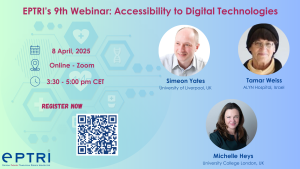 The 9th webinar on Accessibility to Digital Technologies organized by the EPTRI Medical Devices Platform was held online on 8th April of 2025.
The 9th webinar on Accessibility to Digital Technologies organized by the EPTRI Medical Devices Platform was held online on 8th April of 2025.
Participants had the chance to learn more about the difficulties of the access to digital health technologies and will explore how to overcome these barriers. The ‘Minimum Digital Living Standard’ (MDLS) project and how different cultural backgrounds can influence the access and acceptance of digital technologies were presented and discussed.
Our first speaker was Simeon Yates. Simeon is the Professor of Digital Culture in the Department of Communications and Media at the University of Liverpool and Joint Director of the Digital Media and Society Research Institute. For the last two decades he has had a focus on projects that address issues of digital inclusion and exclusion. Simeon is leading the project to define a “Minimum Digital Living Standard” for UK households – funded by the Nuffield Foundation. He is also deputy director of the DSTL Defence Data Research Centre and one of the leads for the ESRC Digital Footprints Programme Strategic Advisory. Simeon presented his project on the “Minimum Digital Living Standard” for UK households.
Our second speaker was Prof. Patrice L. (Tamar) Weiss. Tamar is a professor emeritus at the University of Haifa and an executive research advisor at The Helmsley Pediatric & Adolescent Rehabilitation Research Center, ALYN Hospital in Israel. Tamar discussed how accessibility with cultural, ethnic, and religious factors significantly influence user acceptance and accessibility of pediatric medical technologies.
Our final speaker was Michelle Heys. Michelle is an NIHR and UCL Professor of Global Child Health at University College London (UCL) Great Ormond Street Institute of Child Health and a Community Paediatrician. Her research focuses on improving health outcomes for children in low-resource settings across the UK, Nepal, India, Zimbabwe and Malawi. Her work particularly addresses the needs of sick and small newborns, children with complex neurodisabilities and unaccompanied asylum-seeking children. Michelle presented Neotree, a digital health initiative aimed at improving newborn care and survival in low-resource settings.
The speakers’ presentations are available here.
Our next webinar will be on Initiatives to support the development of Medical Devices and will take place online on 28th of May 2025.
Stay tuned for more information!
